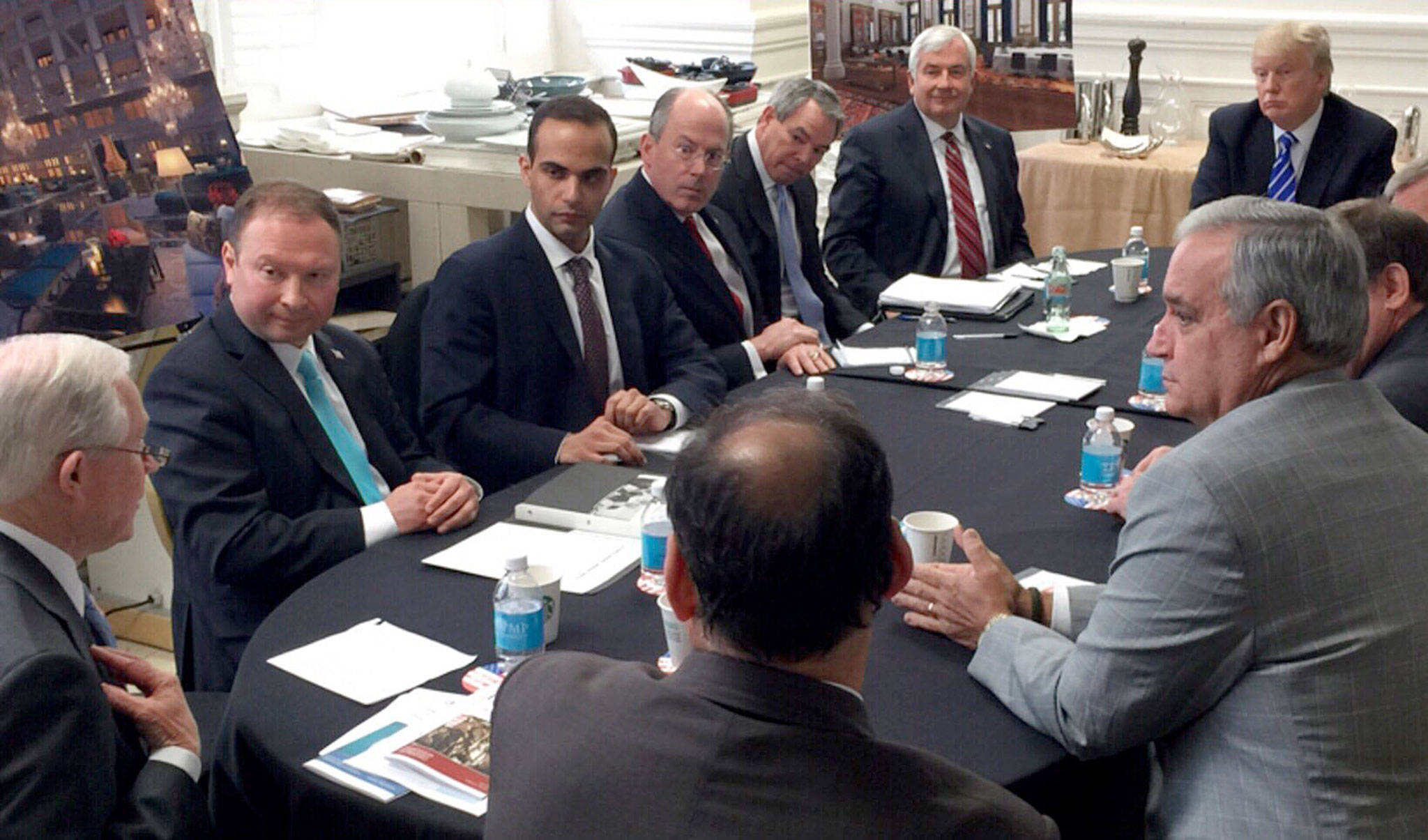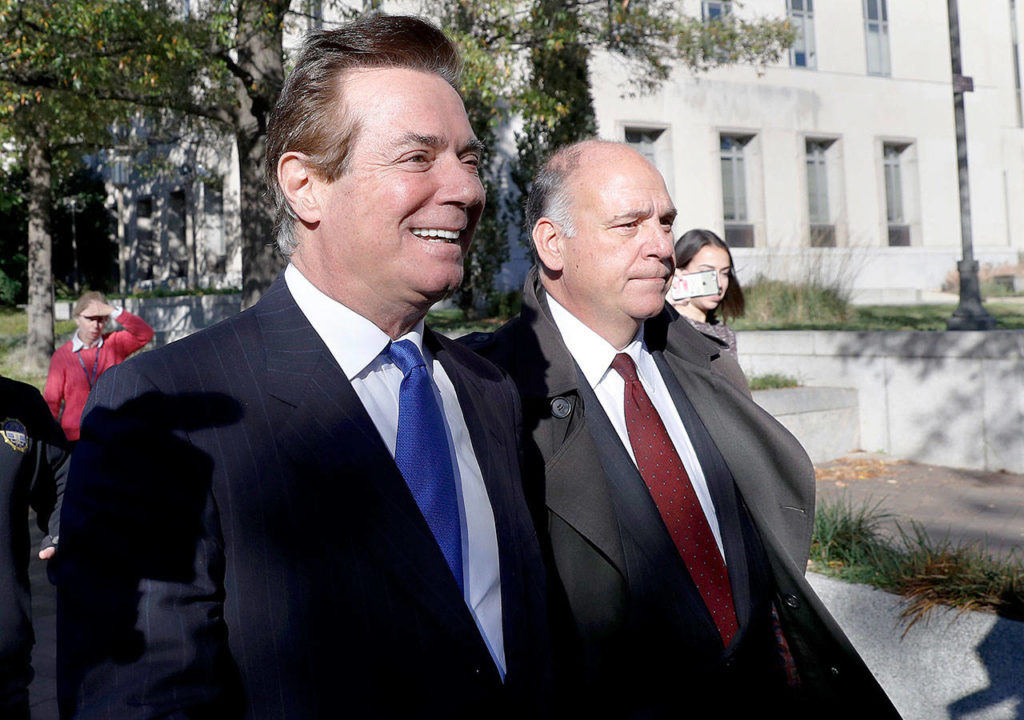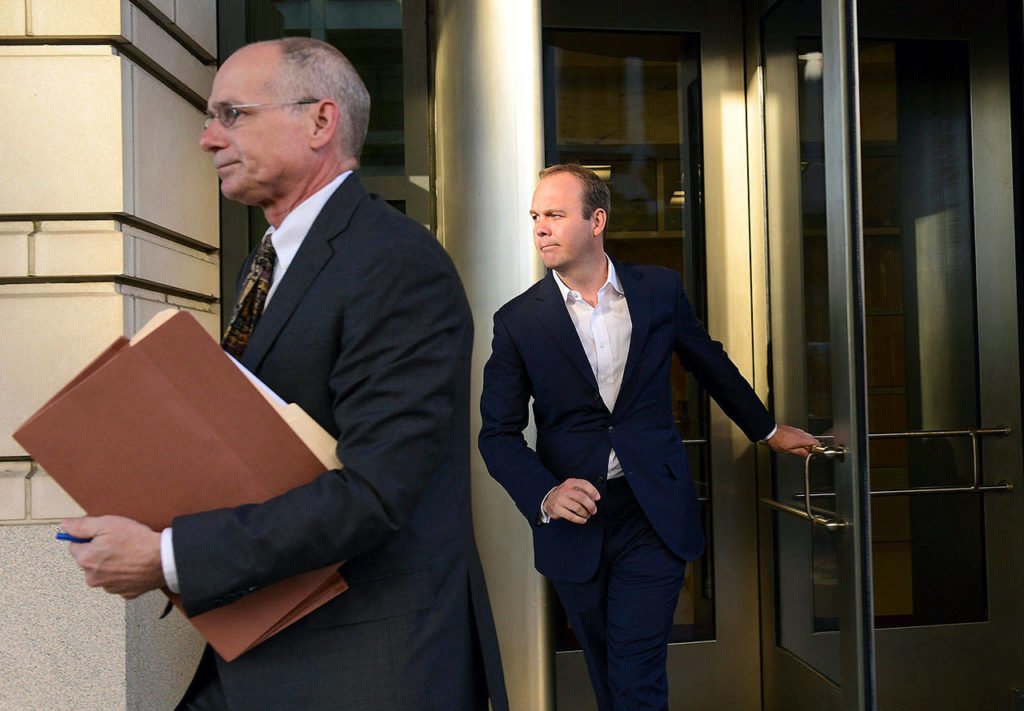By James Hohmann / The Washington Post
The ghost of Paul Manafort haunts the White House this Halloween.
Since President Donald Trump likes alliterative nicknames, maybe the special counsel’s should be Methodical Mueller.
Unveiling the first batch of criminal allegations to come from probes into possible Russian influence in the American political system, Robert Mueller proved Monday that he is not messing around. The former FBI director has played his cards carefully since his appointment in May. He’s clearly turning over every rock to see what crawls out from underneath. Unafraid to play hardball, he’s being strategic in showing his hand.
You surely know the news by now: Manafort, the former Trump campaign chairman, and his longtime business partner, Rick Gates, were charged in a 12-count indictment with conspiracy to launder money, making false statements and other charges in connection with their work advising a Russia-friendly political party in Ukraine.
But the biggest bombshell of Monday — the real October Surprise — is that former Trump foreign policy adviser George Papadopoulos agreed to a plea deal and admitted to making a false statement to FBI investigators about his contacts with foreigners claiming to have high-level Russian connections.
Here are 10 takeaways from Mueller’s opening gambit:
1. We now know that multiple members of the Trump campaign at least entertained the idea of getting help from the Russians.
The DNC email system was hacked in March 2016. Papadopoulos began communicating with someone he believed to be linked to the Russian government. By July, Trump was publicly encouraging the Kremlin to release Hillary Clinton’s emails. “The White House can no longer claim honestly (if it ever could) that the investigation into Russian collusion is nonexistent,” The Post’s Jennifer Rubin notes.
This comes against the backdrop of the June 2016 meeting at Trump Tower that we already knew about, which came after Donald Trump Jr. emailed that he loved the idea of getting dirt from Russia about Hillary Clinton.
“At this point, it would be a truly remarkable coincidence if two entities that had so many ties to each other, that had so much information about what the other was doing, and that were working so hard toward the same goal never found a way to coordinate,” Vox’s Ezra Klein writes.
2. Sam Clovis is about to be in the hot seat.
The former Iowa radio host and social conservative activist is awaiting Senate confirmation to serve in the Agriculture Department’s top scientific post. His confirmation hearing is expected next month.
Victoria Toensing, an attorney for Clovis, confirmed to our Rosalind Helderman that several references in court filings to “the campaign supervisor” refer to the former radio host from Iowa, who served as Trump’s national campaign co-chairman.
“At one point, Papadopoulos emailed Clovis and other campaign officials about a March 24, 2016, meeting he had in London with a professor, who had introduced him to the Russian ambassador and a Russian woman he described as ‘Putin’s niece,’” Helderman reports. “The group had talked about arranging a meeting ‘between us and the Russian leadership to discuss U.S.-Russia ties under President Trump,’ Papadopoulos wrote. (Papadopoulos later learned that the woman was not Putin’s niece, and while he expected to meet the ambassador, he never did, according to filings.) Clovis responded that he would ‘work it through the campaign,’ adding, ‘great work,’ according to court documents.
“In August 2016, Clovis responded to efforts by Papadopoulos to organize an ‘off the record’ meeting with Russian officials. ‘I would encourage you’ and another foreign policy adviser to the campaign to ‘make the trip, if it is feasible,’ Clovis wrote. Toensing said Clovis ‘always vigorously opposed any Russian trip for Donald Trump and/or the campaign.’ She said his responses to Papadopoulos were courtesy by ‘a polite gentleman from Iowa.’”
Will Trump stand by him?
3. Papadopoulos is helping the government, but we still don’t know how much.
Papadopoulos has been working with Mueller’s team for three months now, and he is described in court documents as a “proactive cooperator.”
Former public defender and professor Seth Abramson explains why that term is probably bad news for others in Trump’s orbit: “Prosecutors often require a defendant to perform cooperative services for the government well in *advance* of his or her formal plea,” he tweeted. “The reason for this is that — via both ‘proffer’ and sometimes actual performance — a defendant must show they’re of value to the government. So there is *every* reason to think that Papadopoulos was wired for sound not long after his arrest on July 27th, 2017 at Dulles airport. For Papadopoulos to get his October 5th plea, one of two things had to be true: (a) the feds had already got good sound from him; or … (b) he’d made a sufficient proffer establishing that he *could* get good sound for them — valuable evidence — shortly after October 5th.”
Former U.S. Attorney Preet Bharara, whom Trump fired earlier this year, told Politico Magazine: “Hard to tell, but the George Papadopoulos guilty plea tells us (a) Mueller is moving fast (b) the Mueller team keeps secrets well (c) more charges should be expected and (d) this team takes obstruction and lying very, very seriously. That should be of concern to some people.”
From the Toronto Star’s Washington reporter:
Papadopoulos is described as "proactive cooperator." Former prosecutor tells me that sometimes means "wore a wire." https://t.co/nQyVCbXy6x— Daniel Dale (@ddale8) October 30, 2017
Daniel Dale tweeted: “Papadopoulos is described as ‘proactive cooperator.’ Former prosecutor tells me that sometimes means ‘wore a wire.’”
4. The updated timeline raises a host of new questions about what Trump knew and when he knew it.
First, was Trump present when Papadopoulos said that he could set up a Trump-Putin meeting? “The indictment says Papadopoulos attended a ‘national security meeting’ about March 31 with ‘Trump and other foreign policy advisers for the campaign,” The Post’s Aaron Blake notes. “It says Papadopoulos told ‘the group’ that he had connections and could arrange a Trump-Putin meeting. The text doesn’t technically say whether Trump was present when this claim was made. But if he was, it would render Trump’s own denials of his campaign’s contact with Russia pretty dishonest.”
Second, did Trump know Papadopoulos had been interviewed by the FBI when he called James Comey in January to allegedly ask for the FBI director’s loyalty?
From an alumnus of Obama’s Justice Department:
The FBI interview where Papadopolous lied about his Russia contacts came on the same day, Jan. 27, Trump asked Comey for a loyalty pledge.— Matthew Miller (@matthewamiller) October 30, 2017
Matthew Miller tweeted: “The FBI interview where Papadopolous lied about his Russia contacts came on the same day, Jan. 27, Trump asked Comey for a loyalty pledge.”
5. Mueller is playing hardball as he tries to flip Manafort and Gates.
Manafort and Gates pleaded not guilty in D.C. federal court. A judge set a $10 million unsecured bond for Manafort and a $5 million unsecured bond for Gates. They will be on home confinement.
“The criminal charge of being an unregistered foreign agent — a so-called ‘FARA violation’ — against Paul Manafort is a rare crime, used just four times (all successfully) in the last decade. Normally, it’s allowed to be just a civil penalty, so the fact that Mueller has deployed it as a criminal one means he’s going for maximum leverage,” Garrett M. Graff explains on Wired.
A former assistant special Watergate prosecutor, Nick Akerman, said the court filings “all spell bad news for Trump” because he cannot see any strong defense to the Manafort indictment. “The only defense that you’ve got is to go in there and start singing like a canary to avoid jail time,” he told our colleagues. “And once he starts singing, one of the tunes is bound to be Donald Trump.”
“Manafort may now be facing the prospect of years in prison, and the indictment seems meticulously rooted in facts and evidence that Robert Mueller accumulated; if I were Manafort, I’d be very worried,” adds New York Times columnist Nicholas Kristof. “Presumably that was the intention, and one purpose of the indictment is to gain leverage to persuade Manafort to testify against others in exchange for leniency. If Manafort pursues his self-interest, my bet is that he’ll sing. That then can become a cascade: He testifies against others, who in turn are pressured to testify against still others. And all this makes it more difficult to protect the man at the center if indeed he has violated the law.”
6. Mueller’s moves are designed to send a message to everyone else entangled in the probe that he’s not messing around.
The Post’s Devlin Barrett, Sari Horwitz and Ellen Nakashima explain why in a story that quotes several legal experts: “This is the way you kick off a big case,” said white-collar defense lawyer Patrick Cotter, who formerly worked alongside the man spearheading the prosecution of Manafort and Gates. “Oh, man, they couldn’t have sent a message any clearer if they’d rented a revolving neon sign in Times Square. And the message isn’t just about Manafort. It’s a message to the next five guys they talk to. And the message is: ‘We are coming, and we are not playing, and we are not bluffing.’”
“Mueller’s team controlled the selection of facts in the Papadoupolous plea. Three messages, at least, shaped their choice,” author and former Post reporter Barton Gellman explained in a series of tweets: “One: Mueller knows things, some of them about Russia, and has proof. He’s warning other campaign witnesses against perjury. Two: He’s not saying exactly what he knows or how. Uncertainty there inspires dread, may flush out evidence he doesn’t even know about. Three: Early cooperation will save you from the worst. Mueller could have taken a lot harsher approach to the Papadopoulos facts. Classic leverage … He may know what you’re hiding. He’ll scorch you & yours if you lie. Spill and he’ll go easier. Don’t wait too long.”
7. Unsealing the guilty plea was an insurance policy that makes it politically untenable for Trump to fire Mueller.
Most congressional Republicans stayed silent in the face of the news, but a handful of key lawmakers on the right telegraphed that firing Mueller would cross an unacceptable red line. Senate Judiciary Committee Chairman Chuck Grassley, R-Iowa, said in a statement said “it’s important to let our legal system run its course”: “It’s good to see the Justice Department taking seriously its responsibility to enforce [FARA].”
“He’s not going to be fired by the president,” Sen. Orrin Hatch, R-Utah, said of Mueller. “Because I know him. He knows that’d be a stupid move.”
Trump lawyers Ty Cobb, John Dowd and Jay Sekulow, who have each advised the president to use caution in his public response to the mounting investigation, all sought on Monday to tamp speculation that Trump is even considering firing Mueller. “Nothing about today’s events alters anything related to our engagement with the special counsel, with whom we continue to cooperate,” Cobb, the White House lawyer overseeing Russia matters, told reporters. “There are no discussions and there is no consideration being given to terminating Mueller.” Sekulow, one of Trump’s outside lawyers, also echoed that response: “There’s no firing-Robert Mueller discussions,” he said. Asked whether Trump is considering pardons for Manafort or Gates, Cobb said: “No, no, no. That’s never come up and won’t come up.”
To be sure, that does not mean he won’t be tempted. Former White House chief strategist Steve Bannon “is pushing Trump to take action against Mueller, urging him in particular to defund the investigation … a move that would defang Mueller without the president formally firing him,” Politico’s Eliana Johnson reports. “Longtime Trump confidant Roger Stone told the Daily Caller that for the president appointing another special counsel — this one to investigate [the Obama-era uranium deal] — was his ‘only chance for survival.’”
8. Monday’s indictments will contribute to a climate of fear in the White House that makes it harder for Trump and his staff to be effective.
“Away from the podium, Trump staffers fretted privately over whether Manafort or Gates might share with Mueller’s team damaging information about other colleagues,” The Post’s Robert Costa, Philip Rucker, and Ashley Parker report. “They expressed concern in particular about Gates because he has a young family, may be more stretched financially than Manafort and continued to be involved in Trump’s political operation and had access to the White House, including attending West Wing meetings after Trump was sworn in. ‘The walls are closing in,’ said one senior Republican in close contact with top staffers … ‘Everyone is freaking out.’”
9. Mueller has proven that his investigation is not partisan.
Democratic uber-lobbyist Tony Podesta abruptly quit his post atop the Podesta Group, the capital’s eighth highest-grossing lobbying firm, just hours after the first indictments were unsealed. The indictments of Manafort and Gates raised questions about the work Podesta’s firm did with Manafort to improve the image of the Ukrainian government.
“Tony’s Podesta Group is one of two firms described in Monday’s indictment as having been recruited by Manafort and Gates to lobby on behalf of Viktor Yanukovych, the former president of Ukraine who fled to Moscow in 2014,” The Post’s Marc Fisher and Carol Leonnig report. “Federal prosecutors have accused Manafort of creating a scheme to mislead the government about his secret work for a Ukrainian political leader. Both the Podesta Group and the other firm, Mercury Public Affairs, have said they were hired to lobby for a European nonprofit based in Brussels trying to polish Ukraine’s image in the West. But behind the scenes, prosecutors allege, the real client was a political party led by the former Ukraine president, who was friendly with Russia.”
10. The indictments cast fresh doubts on Trump’s judgment and his discernment in surrounding himself with good people.
It was widely and publicly known that Manafort was one sketchy hombre when Trump hired him to run his campaign last year. Buzzfeed’s Ben Smith has a good primer on “the open secrets of the Russia story,” detailing the long and well-known history of Manafort and Gates’s work abroad.
Manafort joined the campaign with his own reasons to help the Russians, separate from Trump’s agenda. While the current charges against Manafort do not focus on attempts to collude with the Russian government, his interests and Russian interests overlapped on several occasions while serving on the campaign.
Finally, and perhaps most significantly, Mike Pence is only vice president today because Manafort persuaded Trump to pick him. It was very clear last summer that the then-Indiana governor would not have gotten tapped for the ticket if Manafort hadn’t prodded the GOP nominee.
With Breanne Deppisch and Joanie Greve.
Talk to us
> Give us your news tips.
> Send us a letter to the editor.
> More Herald contact information.



























